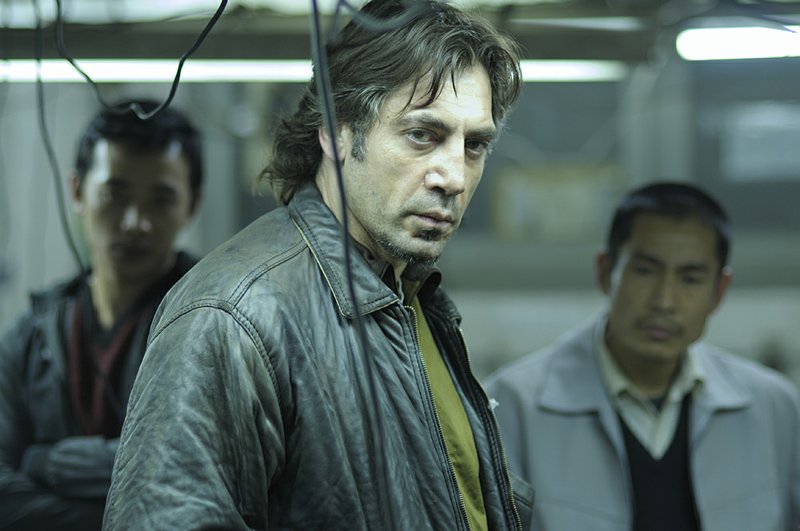LITTLE ROCK — Uxbal (Javier Bardem) is an ex-man, a mutant whose super power is the ability to hear the prayers of the recently departed. He can be their intercessory, he can ferry their assurances back to the grieving living. (Papa, it is all right.) It is his gift, and he (usually) gives it to the world freely.
Uxbal is a dead man walking. He is urinating blood. There is no science to save him. His doctor talks weeks, months. It is time to put his affairs in order. And his affairs are messy. Uxbal has promises to keep.
Uxbal is a petty criminal, a fixer on the shadowier streets of Barcelona, who bribes cops and facilitates for businessmen who need to take shortcuts.
Uxbal is a father to his two children, who live with him and nottheir alcoholic mother (Maricel Alvarez), who has problems that run deeper than her alcoholism.
Uxbal is an angel. He looks out for sidewalk vendors from Africa, for illegal Chinese laborers. When Bob Dylan sang that “to live outside the law you must be honest,” he was thinking of men like Uxbal.
Biutiful is Uxbal’s story. It is aptly titled, for as busted up and blue as his story is, it is beautiful, brimming with inexpressible feeling, a kind of joy, of being alive despite it all. It is a remarkable poetic film that is downbeat yet uplifting, unflinching yet romantic. It is a love story, a parable, an intensely personal work that means to move the world.
That’s the part that some people have a problem with, I guess. I don’t know why so many of us are so prejudiced against ambition. But I think it may have more to do with our deficiencies of spirit than with those we reflexively label “pretentious.” Alejandro Gonzalez Inarritu is perhaps the most artistically ambitious director working in mainstream cinema today, and he’s also one of the most vilified by a certain species of serious moviegoer.
Inarritu wants to make great movies - I think he does make great movies - but there is something in the straightforwardness of this aim that irritates those who prefer impoverished and deranged delusions of grandeur to well-financed campaigns for excellence, or - as Manny Farber almost put it - termites to white pachyderms.
I kind of get that, in that I’m a termite guy myself - I like the exuberance of amateur, the accidental grace notes that sometimes (but not usually) befall the semi-competent. Because it is an artist’s job to persuade us to care about his personal obsession, enthusiasm and energy can count for a lot.
But then there are artists who transport us to their self built, perfected worlds - artists with virtuostic technique and supreme command of their chosen form whose power must be acknowledged. David Fincher will fill the closed desk drawers of his vintage sets with period pens and notepads. He’ll adjust the leaves on the trees behind the actors he’s shooting - he’s a little god who means to keep his eye on every sparrow in his film.
I think of Inarritu as a Latin Fincher, with the same precision, the same insistence on controlling his frame. But he’s got a different kind of fire; Inarritu’s movies are suffused with humanism, and they engage with mystery in much the same way as the novels of Jorge Luis Borges and Gabriel Garcia Marquez. Inarritu is, if anything, subtler about the teasing out of magic; he doesn’t present us with the fantastic quite as abruptly as the writers might - but the strange and the wonderful routinely break in on his movies.
Inarritu’s chief subject is the human soul. He’s a cartographer of that unseeable yet profoundly felt dimension of our existence. I suppose that makes some of us uncomfortable. I suppose that is his purpose.
He’s rather less successful at making connections between the hyper-local and the international, and there’s a way to describe the “plot” of Biutiful that makes it sound ridiculous - Inarritu investigates the tribulations of immigrants as well as Uxbal’s final days. It’s not a badly realized subplot, but a superfluous one. Uxbal is as much a stranger in a strange land as any other character in the film.
In the end, the reason you will want to see Biutiful even if you don’t care for Inarritu films is the star turn by Bardem, who, if he cared to, could stake a claim to being the world’s most interesting actor. He is battered and magnificent, one of those men Sartre would have identified as a “street saint.”
Or you might consider him a superhero.
MovieStyle, Pages 35 on 03/04/2011
